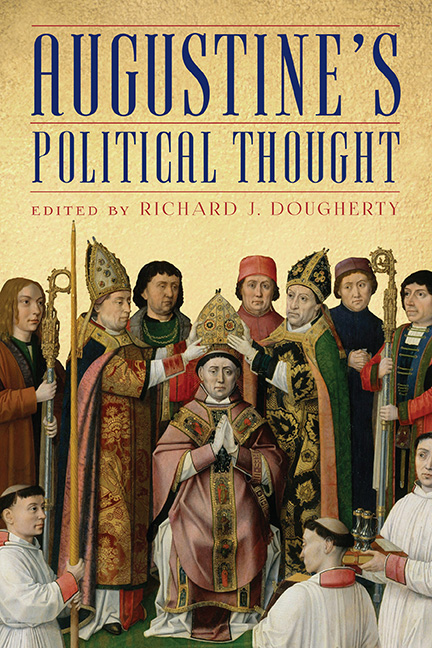Book contents
- Frontmatter
- Contents
- Acknowledgments
- Introduction
- Part 1 Politics, Nature, and Virtue
- 1 St. Augustine and the Problem of Political Ethics in The City of God
- 2 The Other Happy Life: The Political Dimensions to St. Augustine's Cassiciacum Dialogues
- 3 Peace in the Order of Nature: Augustine, Giles, and Dante
- 4 Deeds and Words: Latreia, Justice, and Mercy in Augustine's Political Thought
- 5 The Investigation of Justice in Augustine's Confessions
- Part 2 St. Augustine and Ancient Political Philosophy
- Notes on Contributors
- Index
1 - St. Augustine and the Problem of Political Ethics in The City of God
from Part 1 - Politics, Nature, and Virtue
Published online by Cambridge University Press: 26 June 2019
- Frontmatter
- Contents
- Acknowledgments
- Introduction
- Part 1 Politics, Nature, and Virtue
- 1 St. Augustine and the Problem of Political Ethics in The City of God
- 2 The Other Happy Life: The Political Dimensions to St. Augustine's Cassiciacum Dialogues
- 3 Peace in the Order of Nature: Augustine, Giles, and Dante
- 4 Deeds and Words: Latreia, Justice, and Mercy in Augustine's Political Thought
- 5 The Investigation of Justice in Augustine's Confessions
- Part 2 St. Augustine and Ancient Political Philosophy
- Notes on Contributors
- Index
Summary
In his Retractions, written near the end of his life, St. Augustine recounts the impetus for writing The City of God. Augustine relates that he was moved to defend Christianity against its pagan critics, who charged that the abandonment of the worship of the pagan gods by recent Roman emperors was responsible for the fall of Rome in 410. He notes that the work as a whole contains two major parts. The first part constitutes books 1 through 10 and consists primarily of an attack on the Roman pagan religion in its practices and its principles. The second part, books 11 through 22, provides the positive defense of the Christian teaching, largely consisting of an extended account of the foundation and distinction between the two cities, the City of God and the earthly city. The title of the work is often given as The City of God Against the Pagans, but that is not Augustine's title, and for good reason; only the first half of the work is aimed at the pagans, while the second half is an extended defense of Christian teaching aimed at strengthening the faith of embattled believers.
St. Augustine's “magnum opus et arduum” is much more than an occasional piece, though. The major concern of this work—the relationship between the City of God and the City of Man—is anticipated in his earlier works, and throughout his works he addresses many of the important concerns of this work. An inventory of the important issues that come to the fore in The City of God would include, at least, the Fall and human redemption, the place of Israel in the plan of Divine Providence, pagan heroism in the light of the Christian understanding of virtue, the dangers of civil theology, the authority and persuasiveness of pagan philosophy, and the place of grace and free will in understanding the operations of the human soul. Foremost among the political concerns addressed in this work are the nature of empire, the relative importance of the political order or regime, the founding of political orders, the character of rulers, and the characteristics that bind political communities together.
The thrust of the first ten books of The City of God is a critique of pagan teaching and practice, and St. Augustine focuses attention on the limitations of Roman religion, politics, and philosophy.
- Type
- Chapter
- Information
- Augustine's Political Thought , pp. 13 - 35Publisher: Boydell & BrewerPrint publication year: 2019

